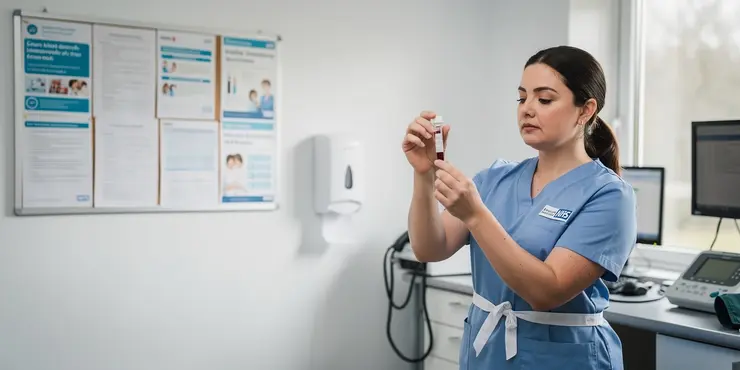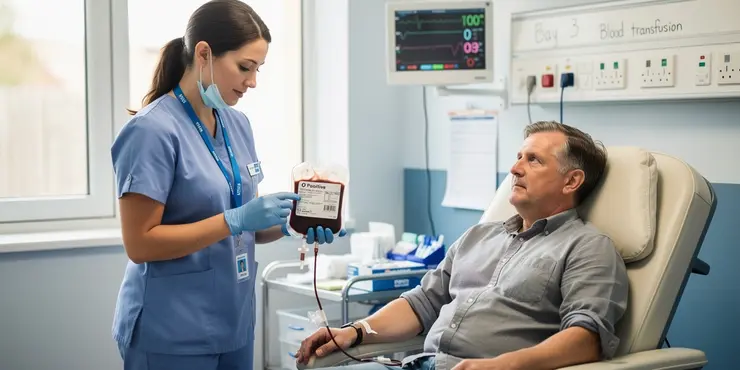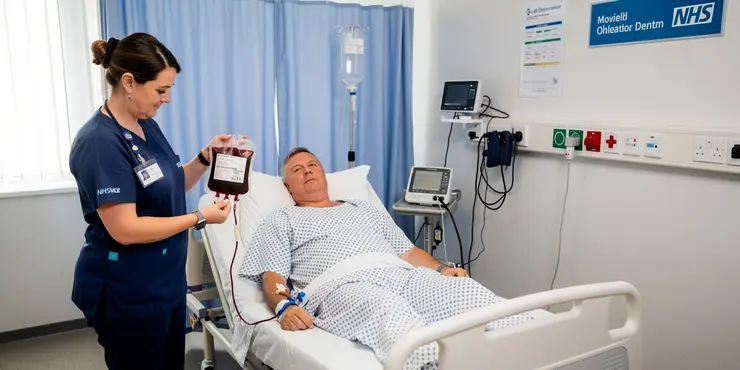
Find Help
More Items From Ergsy search
-

Is Hepatitis B a risk in blood transfusions?
Relevance: 100%
-

Are there risks associated with blood transfusions?
Relevance: 69%
-

What is the most common disease transmitted by blood transfusion?
Relevance: 64%
-

What diseases can be spread by blood transfusions?
Relevance: 63%
-

Is HTLV a risk in blood transfusions?
Relevance: 61%
-
Blood Product Transfusions
Relevance: 56%
-
What is a blood transfusion?
Relevance: 53%
-

Sue Doherty on hepatitis C awareness
Relevance: 52%
-

Blood Transfusion
Relevance: 51%
-

What measures are taken to prevent disease transmission in blood transfusions?
Relevance: 51%
-
Is there an age limit for receiving blood transfusions?
Relevance: 50%
-
Is Zika virus screened for in blood transfusions?
Relevance: 49%
-

Is Chagas disease a concern with blood transfusions?
Relevance: 48%
-
Can HIV be transmitted through blood transfusions?
Relevance: 48%
-

Can syphilis be transmitted via blood transfusion?
Relevance: 47%
-
Can bacterial infections be transmitted through blood transfusion?
Relevance: 47%
-
Why might someone need a blood transfusion?
Relevance: 47%
-

Are there any parasites that can be transmitted through blood transfusions?
Relevance: 47%
-
Is malaria still a concern for blood transfusion safety?
Relevance: 46%
-
Can someone have a reaction to a mismatched blood transfusion?
Relevance: 46%
-
Can Dengue fever be transmitted through blood transfusions?
Relevance: 46%
-

What types of blood products can be transfused?
Relevance: 46%
-
Can certain medical conditions prevent receiving blood transfusions?
Relevance: 46%
-
How long does a blood transfusion take?
Relevance: 45%
-
Can people of any blood type receive a transfusion of any blood type?
Relevance: 45%
-

Can COVID-19 be transmitted through blood transfusions?
Relevance: 45%
-

What other viruses are tested for in blood donations?
Relevance: 45%
-

How do healthcare providers match blood for transfusions?
Relevance: 44%
-
What are some common reasons blood transfusions are needed?
Relevance: 44%
-

How is blood screened to prevent disease transmission?
Relevance: 43%
-

How do doctors determine how much blood is needed for a transfusion?
Relevance: 43%
-
Is blood used for transfusions safe?
Relevance: 43%
-
Can you get any prion diseases from blood transfusion?
Relevance: 43%
-
Are new emerging pathogens a risk for blood safety?
Relevance: 42%
-

Are there global differences in screening for blood transfusions?
Relevance: 40%
-

What is the new treatment for hepatitis C like?
Relevance: 39%
-

Can cytomegalovirus (CMV) be spread through transfusions?
Relevance: 37%
-

What is plasma, and why might it be transfused?
Relevance: 37%
-
What should a patient expect after a blood transfusion?
Relevance: 31%
-
What kind of follow-up care is needed after a blood transfusion?
Relevance: 31%
Understanding Hepatitis B
Hepatitis B is a liver infection caused by the hepatitis B virus (HBV). It can cause both acute and chronic diseases, and it poses significant health risks if not managed effectively. The virus is transmitted through contact with infectious body fluids, such as blood. Understanding the risk factors associated with HBV is crucial in preventing its spread.
Transmission Through Blood Transfusions
Blood transfusions are a critical component of modern medicine, used to replace lost components of the blood in patients who have suffered trauma, undergone surgery, or have medical conditions affecting blood production or quality. However, blood transfusions can pose a risk of transmitting infections, including hepatitis B, if appropriate screening measures are not in place.
Screening and Safety Measures in the UK
In the UK, stringent screening processes are implemented to ensure the safety of blood donations. All blood donations are tested for HBV among other infectious diseases. The testing process is highly sensitive and is designed to detect the presence of the virus to prevent any contaminated blood from being transfused to recipients. This makes the risk of acquiring hepatitis B through a blood transfusion extremely low within the UK healthcare system.
Impact of Hepatitis B in Blood Transfusions
Despite the low risk, the impact of an HBV infection acquired through blood transfusion can be significant. Hepatitis B can lead to long-term health issues such as chronic liver disease, liver cirrhosis, or even liver cancer. This is why ensuring the safety of blood supplies is a top priority, and continued vigilance in screening and testing is crucial.
Improvements in Blood Transfusion Safety
Over the years, advances in medical technology and diagnostic testing have greatly improved the safety of blood transfusions. In the UK, the implementation of nucleic acid amplification testing (NAT) has enhanced the ability to detect HBV even in its early stages. Current protocols ensure that blood and blood products are as safe as possible for patients who need them.
Conclusion
While hepatitis B is indeed a potential risk associated with blood transfusions, the rigorous screening processes in place in the UK significantly minimise this risk. Continuous improvements in testing techniques and diligent adherence to safety procedures help ensure the safety and wellbeing of individuals requiring blood transfusions. Public awareness and careful adherence to donor screening guidelines further contribute to making blood transfusions safe and effective in preventing the transmission of hepatitis B and other infectious diseases.
What is Hepatitis B?
Hepatitis B is a disease of the liver. It happens because of a germ called the hepatitis B virus (HBV). This disease can be short-term or long-term. It can be very harmful if we don't take care of it. The virus spreads through body fluids like blood. It is important to know how HBV spreads so we can stop it.
Can You Get It From Blood Transfusions?
Blood transfusions are very important in hospitals. Doctors use them to help people who are hurt or sick. But, they can spread diseases like hepatitis B if the blood is not checked properly. It is very important to test blood to make sure it does not have the virus.
How Does the UK Keep Blood Safe?
In the UK, all blood donations are tested carefully. This makes sure the blood is safe to give to patients. They check for hepatitis B and other germs. The tests are very good at finding the virus. This makes the chance of getting hepatitis B from blood transfusions very low in the UK.
Why Is Safety Important?
Although the risk is low, getting hepatitis B from a blood transfusion can be serious. It can cause ongoing health problems like liver disease or liver cancer. Because of this, it is very important to make sure all blood is safe. Testing and checking blood is a top priority.
How Has Blood Safety Improved?
Over time, new technology has made blood transfusions safer. In the UK, a special test helps find the virus early. It checks blood more carefully. This means people who need transfusions get blood that is safe.
Conclusion
Hepatitis B can be a risk with blood transfusions. But in the UK, the tests are very good at stopping this risk. By improving the tests and always following safety rules, blood transfusions are safe. Knowing about this and checking all blood donations help keep everyone healthy.
Frequently Asked Questions
What is Hepatitis B?
Hepatitis B is a liver infection caused by the Hepatitis B virus (HBV). It can lead to both acute and chronic disease.
How is Hepatitis B transmitted?
Hepatitis B is transmitted through contact with infectious body fluids, such as blood, semen, and vaginal fluids.
Is it possible to get Hepatitis B from a blood transfusion?
While rare due to thorough screening processes, there is still a risk of transmitting Hepatitis B through a blood transfusion if the blood is not properly screened.
What measures are taken to ensure blood safety for Hepatitis B?
Blood donations are screened for Hepatitis B surface antigen (HBsAg), antibody to Hepatitis B core antigen (anti-HBc), and nucleic acid tests (NAT) for HBV DNA to ensure safety.
Has blood transfusion-related Hepatitis B transmission decreased?
Yes, the incidence of Hepatitis B transmission via blood transfusion has significantly decreased with the implementation of rigorous screening techniques.
What is the window period for Hepatitis B detection in blood donors?
The window period refers to the time after infection in which the virus is not yet detectable by common blood screening tests. For Hepatitis B, this period is typically 30-60 days.
What happens if donated blood is found to be Hepatitis B positive?
If blood tests positive for Hepatitis B, the donation is discarded, and the donor is notified and referred for medical evaluation.
Can individuals with a history of Hepatitis B donate blood?
Individuals with a history of infection or chronic Hepatitis B are generally not allowed to donate blood to prevent potential transmission.
Are there vaccines available to protect against Hepatitis B?
Yes, an effective Hepatitis B vaccine is available and is typically administered in a series of shots to provide immunity against the virus.
Can vaccinated individuals for Hepatitis B donate blood?
Yes, individuals who have been vaccinated against Hepatitis B and are otherwise eligible can donate blood.
How effective is the Hepatitis B vaccine?
The Hepatitis B vaccine is over 90% effective in preventing infection with the HBV in individuals who complete the vaccination series.
Are there specific blood donation criteria related to Hepatitis B?
The criteria vary, but generally include screening questions to assess risk factors for Hepatitis B infection and blood tests to screen for the virus.
How long can the Hepatitis B virus survive outside the body?
HBV can survive outside the body for at least 7 days and still cause infection if it enters the body of an unvaccinated person.
What symptoms might an individual with Hepatitis B experience?
Symptoms can include jaundice, fatigue, abdominal pain, loss of appetite, nausea, and vomiting.
Are all donors screened for Hepatitis B in blood banks?
Yes, all donated blood is screened for Hepatitis B to minimize the risk of transmission through transfusion.
What role does nucleic acid testing (NAT) play in blood screening?
NAT helps detect the genetic material of HBV, which can identify infections earlier and reduce the window period of undetectable infection.
What should recipients of blood transfusions do to minimize risks?
Patients should ensure transfusions are performed at reputable medical facilities that adhere to strict screening protocols.
How often do guidelines for blood screening update?
Guidelines are regularly evaluated and updated based on new research and emerging technologies to enhance blood safety.
What are the consequences of contracting Hepatitis B?
Consequences can include chronic liver disease, cirrhosis, liver cancer, and liver failure if left untreated.
Is there treatment available for Hepatitis B?
Yes, treatments are available to manage chronic Hepatitis B, including antiviral medications that can help control virus replication and reduce liver damage.
What is Hepatitis B?
Hepatitis B is an illness. It makes your liver (the part of your body that cleans your blood) not work well. A tiny germ called a virus causes it. You can feel sick and tired when you have it. Some people might not feel sick, but they can still pass the virus to others.
If you want to know more, you can ask a doctor or nurse. They can help you understand and stay healthy. You can also use pictures and videos to help you learn more. It's okay to ask for help if you need it.
Hepatitis B is a sickness that hurts the liver. It happens because of a virus named Hepatitis B virus (HBV). This sickness can be short or last a long time.
How can you catch Hepatitis B?
Hepatitis B is a virus. This means it can spread from one person to another.
Here are some ways you can catch it:
- If blood from a person with the virus gets into your body.
- If you have sex with someone who has the virus.
- If you share needles with someone who has the virus.
- If a mother has the virus, she can pass it to her baby during birth.
Here are ways you can protect yourself:
- Get a vaccine to protect against the virus.
- Use a condom if you have sex.
- Do not share needles or other personal items.
If you need help or more information, you can:
- Ask a nurse or doctor.
- Look for information on health websites.
Hepatitis B is a sickness you can catch from someone else's body fluids. This means things like their blood, sperm, or the fluids from a woman's private parts.
If you struggle with reading, using pictures or videos can help you understand better. You can also ask a grown-up for help. They can explain things to you in a way that's easy to understand.
Can you get Hepatitis B from a blood transfusion?
Hepatitis B is a liver illness. It is caused by a virus.
You can get Hepatitis B from blood.
A blood transfusion is when you get blood from someone else.
It is rare, but possible, to get Hepatitis B from a blood transfusion.
Doctors check the blood to make sure it is safe.
A supportive tool is to ask a doctor or nurse if you are unsure.
Most of the time, blood is checked to make sure it is safe. But sometimes, this checking can miss something. This means Hepatitis B, a sickness that affects your liver, could still be passed on when you get blood from someone else.
How do we keep blood safe from Hepatitis B?
Hospitals and doctors use special steps to make sure blood is safe. Here are some ways they do it:
- They test the blood for Hepatitis B. This helps to check if the blood is okay.
- People who donate blood are asked important questions. This helps to know if they are healthy.
- They only take blood from people who are well.
If you want to know more, you can use tools like picture books or apps that read the words out loud. These can help you understand better.
When people give blood, it is checked to make sure it is safe. Doctors look for something called Hepatitis B in the blood. They use special tests:
- One test looks for something called HBsAg.
- Another test looks for something called anti-HBc.
- A special DNA test is used to check for HBV.
These tests help keep the blood safe.
Has giving blood caused less Hepatitis B now?
Yes, the chance of getting Hepatitis B from a blood transfusion is much lower now. This is because we check the blood very carefully.
How long does it take to find Hepatitis B in blood donors?
Sometimes, it takes a while to find out if someone has Hepatitis B in their blood. This time is called the "window period." It is important to know for checking blood donors.
If you need help reading, you can:
- Ask a friend or family member to explain.
- Use an app or tool that reads text out loud.
The window period is the time right after a person gets sick, but tests can't find the virus yet. For Hepatitis B, this time is usually 30 to 60 days.
What happens if donated blood has Hepatitis B?
When someone gives blood, the blood is checked to make sure it is safe. If the blood has Hepatitis B, it means it is not safe to use. Here is what happens:
- The blood is not given to anyone. It is thrown away.
- The person who gave the blood is told they have Hepatitis B. They will get help and see a doctor.
- The doctor can help the person feel better and stay healthy.
If you find it hard to read or understand, you can use tools that read the text aloud for you. You can also ask someone, like a teacher or a friend, to help explain it.
If a blood test shows Hepatitis B, the blood donation is thrown away. The person who gave the blood is told. They are also asked to see a doctor to get checked.
Can people who had Hepatitis B give blood?
If you had Hepatitis B, you might not be able to give blood. It is important to keep everyone safe.
If you want to help, you can talk to someone at the blood donation center. They can tell you what to do.
Here is something that might help you: Ask an adult or a friend to read with you.
People who have been sick with Hepatitis B before, or have it all the time, usually cannot donate blood. This is because it might spread to others.
Is there a shot to stop you from getting Hepatitis B?
Yes, there is a good vaccine for Hepatitis B. This vaccine helps your body fight the virus. You get the vaccine in a few shots to make sure you are safe from the virus.
If you find reading hard, you can try using audiobooks or ask someone to read with you. You can also use tools like speech-to-text apps to help understand better.
Can people who got the Hepatitis B vaccine give blood?
Yes, people who have had a Hepatitis B vaccination and meet the other requirements can give blood.
How well does the Hepatitis B vaccine work?
The Hepatitis B vaccine helps protect you from getting sick. It is very strong and works well for most people.
If you get the vaccine, it is less likely that you will get Hepatitis B, which is a liver disease.
Doctors say this vaccine works more than 90% of the time. That means it helps 9 out of 10 people stay healthy.
If you want to know more, you can ask your doctor or nurse. They can help you understand how it works.
It can also help to look at pictures or watch videos about the vaccine. These tools can make it easier to understand.
The Hepatitis B shot works really well. If you get all your shots, you have more than a 90% chance of not getting the Hepatitis B virus.
Lots of people find it helpful to use tools like pictures or videos to understand more about the vaccine. You can also ask a parent or teacher to help explain it.
Can I Give Blood if I Have Had Hepatitis B?
If you have had Hepatitis B, you might not be able to donate blood.
Before you give blood, they will ask you some questions to keep everyone safe.
You can talk to a doctor or nurse if you need help. They can explain what you need to know.
Doctors use different ways to check for Hepatitis B. They ask questions to see if you might have the virus. They also do blood tests to look for it.
How long can the Hepatitis B virus live outside the body?
The Hepatitis B virus can stay alive outside the body for about 7 days. During this time, it can still make people sick if they are exposed to it.
Helpful tips:
- Wash your hands often with soap and water to stay safe.
- Use disinfectant to clean surfaces where the virus might be.
- Get a vaccine to protect yourself from Hepatitis B.
Tools that can help:
- Pictograms: Use pictures or icons to explain the information.
- Simple videos: Watch videos that explain the topic in a simple way.
Hepatitis B virus (HBV) can stay alive outside the body for at least 7 days. If it gets into the body of someone who has not had the vaccine, it can make them sick.
What signs show someone might have Hepatitis B?
Here are some signs that someone might have Hepatitis B:
- Feeling very tired
- Feeling sick in the tummy
- Not feeling hungry
- Pain in the tummy
- Dark pee, like tea or cola
- Light-colored poop
- Skin or eyes turning yellow (called jaundice)
If you think someone has these signs, it is important to talk to a doctor.
Using pictures or videos can help make things easier to understand.
Signs can be:
- Yellow skin (called jaundice)
- Feeling very tired
- Belly hurts
- Not feeling hungry
- Feeling sick
- Throwing up
Try using tools that read text out loud to you or apps that explain hard words. These can help you understand better.
Do blood banks check all donors for Hepatitis B?
Yes, all donated blood is checked to make sure it does not have Hepatitis B. This helps keep people safe when they need a blood transfusion.
What is nucleic acid testing (NAT) used for in blood screening?
Nucleic acid testing, or NAT, is a special test.
This test helps make sure the blood is safe to use.
NAT looks for tiny pieces of germs in the blood.
This helps find out if the blood might make someone sick.
By using NAT, doctors can make sure the blood is safe for people to receive.
If you need help understanding, you can ask someone to explain it to you.
NAT looks for tiny parts of the HBV virus. This helps find the virus sooner and makes it easier to spot even when it's hard to see at first.
This can be done using simple language and pictures to help understand. It might also help to use colored markers or stickers to track what you learn.
What Can You Do to Stay Safe After a Blood Transfusion?
Here are some simple steps:
- Talk to your doctor: Ask questions and tell them how you feel.
- Learn about symptoms: Know what signs to watch for, like feeling weak or having a fever.
- Follow doctor's advice: Do what your doctor tells you to do after the transfusion.
- Use a checklist: Make sure you have done everything your doctor asked.
If you feel unwell, ask for help right away.
Using a calendar or reminder app can help you keep track of any follow-up appointments.
You should always get your blood transfusion at a good hospital or clinic. They need to check the blood very carefully.
How often do the rules for blood tests change?
The rules for blood tests are changed every so often. This means new rules come out to keep everyone safe and healthy.
To help understand, you can:
- Ask a doctor or nurse to explain the rules.
- Use picture cards or simple charts to show what the rules mean.
- Watch videos or find apps that explain blood test rules in a simple way.
Guidelines change often. Experts look at new studies and new tools to make sure blood is safe.
What happens if you get Hepatitis B?
If you get Hepatitis B, it can make you feel very sick. It can hurt your liver, which is an important part of your body that helps clean your blood.
Some people might not feel sick at first, but they can still spread it to others.
It's important to see a doctor if you think you have Hepatitis B, so they can help you get better.
You can ask someone you trust to help read and understand more about it.
If reading is hard, you can use tools like audiobooks or ask someone to read it out loud.
If not treated, it can cause big health problems. You might have liver disease for a long time. The liver can get very sick, get cancer, or stop working.
Can Hepatitis B be treated?
Yes, there is treatment for Hepatitis B.
Here is how you can manage it:
- See a doctor. They can give you medicine.
- Get regular check-ups to stay healthy.
- Eat healthy food and rest well.
Tools to help you understand more:
- Ask your doctor questions if you do not understand.
- Use pictures or videos to learn more.
- Talk to a friend or family member who can help you.
Yes, there are treatments to help people with long-term Hepatitis B. There are special medicines that can help stop the virus from spreading and protect the liver from damage.
Useful Links
This website offers general information and is not a substitute for professional advice.
Always seek guidance from qualified professionals.
If you have any medical concerns or need urgent help, contact a healthcare professional or emergency services immediately.
Some of this content was generated with AI assistance. We’ve done our best to keep it accurate, helpful, and human-friendly.
- Ergsy carfully checks the information in the videos we provide here.
- Videos shown by Youtube after a video has completed, have NOT been reviewed by ERGSY.
- To view, click the arrow in centre of video.
- Most of the videos you find here will have subtitles and/or closed captions available.
- You may need to turn these on, and choose your preferred language.
- Go to the video you'd like to watch.
- If closed captions (CC) are available, settings will be visible on the bottom right of the video player.
- To turn on Captions, click settings .
- To turn off Captions, click settings again.
More Items From Ergsy search
-

Is Hepatitis B a risk in blood transfusions?
Relevance: 100%
-

Are there risks associated with blood transfusions?
Relevance: 69%
-

What is the most common disease transmitted by blood transfusion?
Relevance: 64%
-

What diseases can be spread by blood transfusions?
Relevance: 63%
-

Is HTLV a risk in blood transfusions?
Relevance: 61%
-
Blood Product Transfusions
Relevance: 56%
-
What is a blood transfusion?
Relevance: 53%
-

Sue Doherty on hepatitis C awareness
Relevance: 52%
-

Blood Transfusion
Relevance: 51%
-

What measures are taken to prevent disease transmission in blood transfusions?
Relevance: 51%
-
Is there an age limit for receiving blood transfusions?
Relevance: 50%
-
Is Zika virus screened for in blood transfusions?
Relevance: 49%
-

Is Chagas disease a concern with blood transfusions?
Relevance: 48%
-
Can HIV be transmitted through blood transfusions?
Relevance: 48%
-

Can syphilis be transmitted via blood transfusion?
Relevance: 47%
-
Can bacterial infections be transmitted through blood transfusion?
Relevance: 47%
-
Why might someone need a blood transfusion?
Relevance: 47%
-

Are there any parasites that can be transmitted through blood transfusions?
Relevance: 47%
-
Is malaria still a concern for blood transfusion safety?
Relevance: 46%
-
Can someone have a reaction to a mismatched blood transfusion?
Relevance: 46%
-
Can Dengue fever be transmitted through blood transfusions?
Relevance: 46%
-

What types of blood products can be transfused?
Relevance: 46%
-
Can certain medical conditions prevent receiving blood transfusions?
Relevance: 46%
-
How long does a blood transfusion take?
Relevance: 45%
-
Can people of any blood type receive a transfusion of any blood type?
Relevance: 45%
-

Can COVID-19 be transmitted through blood transfusions?
Relevance: 45%
-

What other viruses are tested for in blood donations?
Relevance: 45%
-

How do healthcare providers match blood for transfusions?
Relevance: 44%
-
What are some common reasons blood transfusions are needed?
Relevance: 44%
-

How is blood screened to prevent disease transmission?
Relevance: 43%
-

How do doctors determine how much blood is needed for a transfusion?
Relevance: 43%
-
Is blood used for transfusions safe?
Relevance: 43%
-
Can you get any prion diseases from blood transfusion?
Relevance: 43%
-
Are new emerging pathogens a risk for blood safety?
Relevance: 42%
-

Are there global differences in screening for blood transfusions?
Relevance: 40%
-

What is the new treatment for hepatitis C like?
Relevance: 39%
-

Can cytomegalovirus (CMV) be spread through transfusions?
Relevance: 37%
-

What is plasma, and why might it be transfused?
Relevance: 37%
-
What should a patient expect after a blood transfusion?
Relevance: 31%
-
What kind of follow-up care is needed after a blood transfusion?
Relevance: 31%


